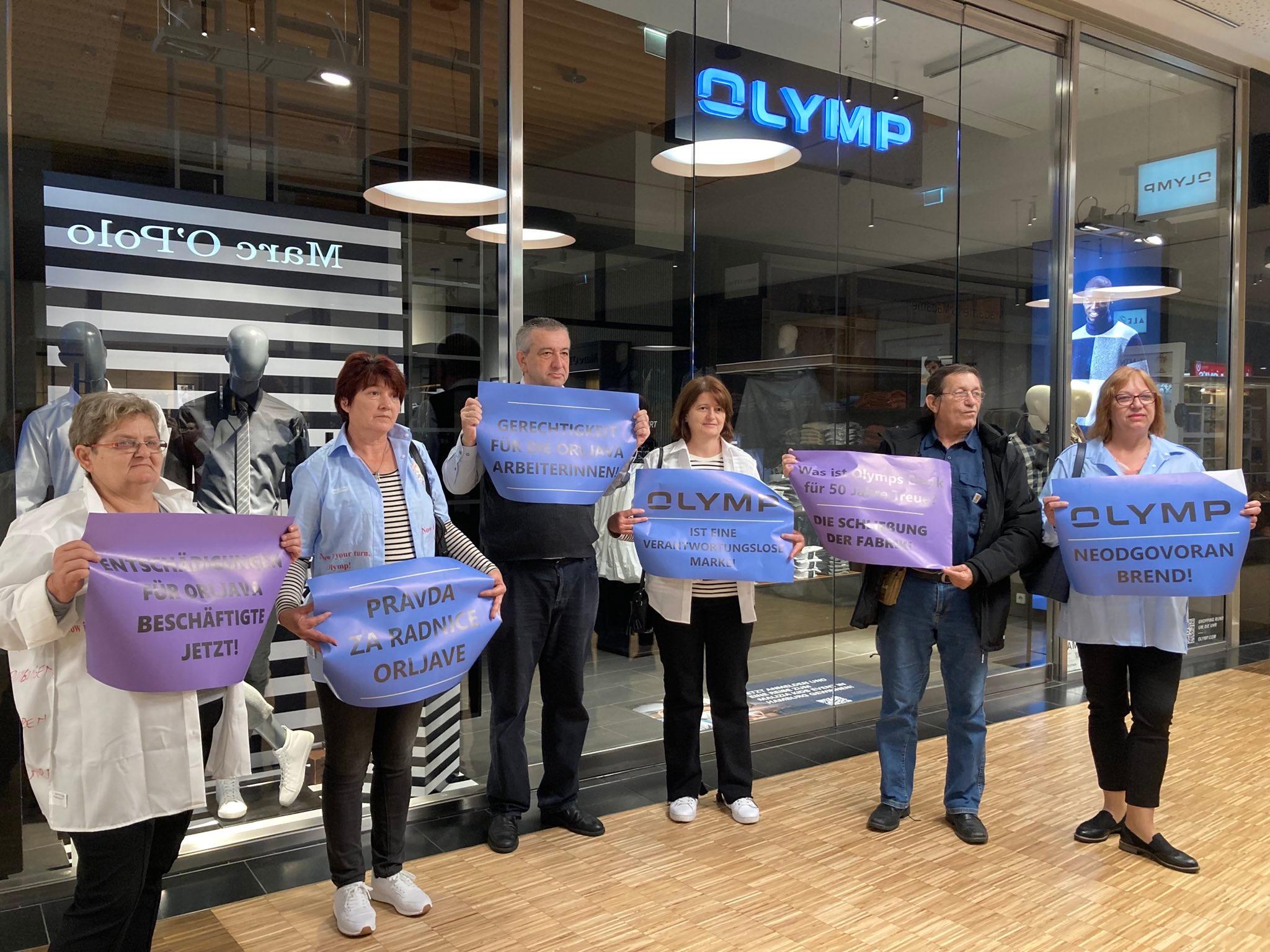
It is your turn Olymp! Former Olymp workers submit a complaint at the German OECD national contact point
Over two years since the announcement that Croatian garment factory Orljava was closing down, the Croatian trade union Novi Sindikat and partner organisation Clean Clothes Campaign (CCC) Germany are filing a complaint against the factory's only foreign buyer, OLYMP, to the German National Contact Point for the Organisation for Economic Co-operation and Development (OECD).
With the complaint, Novi Sindikat and CCC Germany are demanding on behalf of Orljava’s former workers that OLYMP: 1) ensures indemnification to the 172 workers that lost their jobs at the time of Orljava’s closure for damage caused by delayed payment and high inflation and 2) mitigates the harm caused to workers. The latter could include supporting them in finding alternative employment and/or consulting with them about resuming production for the brand in Požega, where the Orljava factory was based.
Former Orljava workers and organisations supporting them are filing their complaint in person to the German NCP in Berlin on Wednesday 25 October. The complainants argue that OLYMP failed to act in accordance with the OECD Guidelines for Multinational Enterprises in two aspects. First, OLYMP has failed to conduct appropriate risk-based due diligence, since it did not take action in preventing or mitigating the adverse impacts that their decision to end the business relationship with Orljava had on the workers. The 172 women that stitched OLYMP’s dress shirts for decades were left jobless after OLYMP exited the factory, causing its bankruptcy. Second, OLYMP has failed to meaningfully engage with relevant stakeholders in relation to its decision to stop working with Orljava. The women workers were kept in the dark about this decision for many months before the factory finally had to close.
The workers turn to the OECD National Contact Point, which can provide mediation and conciliation around non-observance of its guidelines. Germany already has a human rights due diligence law in place, but this case is a painful reminder of the limits of this law which exempts companies with fewer than 3000 staff in Germany. The case of OLYMP, with only about 500 staff in Germany, shows that also smaller companies have considerable influence on the harm done and access to remedy for workers in its supply chain. However, all multinational enterprises, regardless of size, are expected to act in accordance with the OECD Guidelines, to which the German government also adheres.
How it began
German menswear brand, OLYMP was the main customer of Croatian state-owned garment factory Orljava, situated in Požega, for decades. For most of the time the factory and its buyer were operating under conditions of exclusivity for the German market. A workforce of 300 people, many of them women, depended for their livelihood on their employment at the dress shirt factory. With the start of the Covid-19 crisis, OLYMP’s order volumes decreased massively, which led the factory to let go nearly half of the workforce. While the factory received financial support from the government as part of their Covid-19 relief policy, the low prices that OLYMP had been paying for its products left the factory with few reserves. This led the factory to become insolvent and be declared bankrupt on 13 July 2021. All 172 workers that were still employed at the Orljava factory instantly lost their jobs without receiving their full severance.
Following a ruling by the Croatian court on severance pay in October 2021, 37,5% of the owed severance was provided by the state by way of immediate relief. The remaining amount, a total of approximately €450,000, would be paid after the liquidation of Orljava’s assets. It took until March 2023 for the Croatian government to finally decide to pay severance and other claims in the amount of €491,074 to 237 ex-workers of the factory Orljava. This decision was confirmed at a meeting with the Croatian prime minister held on 8 March 2023.
Mario Iveković of Novi Sindikat comments: „We are glad that one of the responsible actors, being the Croatian government, showed responsibility, but we also still expect OLYMP as the exclusive foreign buyer to take action to support the former workers of Orljava, many of whom remain without employment to this day. It’s your turn, OLYMP!“
Snježana, who worked for the Orljava factory for three decades, said: „I worked for OLYMP for 31 years in all kinds of conditions, including war. I lost my health, and I didn't even get to retire."
The workers, trade union, and CCC Germany are set to have a meeting with representatives of OLYMP and multi-stakeholder initiative Fair Wear Foundation the day after the filing of the complaint, on 26 October, which creates a first opportunity for the company to respond. The complainants are optimistic that the German National Contact Point, being a well-respected independent party, can facilitate further constructive dialogue if OLYMP is willing to engage. The complainants have also asked the German National Contact Point to clarify what OLYMP should have done in order to exit responsibly and how the company may improve its policies to prevent similar situations from occurring at other suppliers in the future.
Clean Clothes Campaign has taken on a number of cases relating to unpaid severance as a result of factory closures in the Covid-19 crisis and beyond. The international network is advocating for garment companies to sign a legally binding agreement to ensure severance payments for future closure cases as well as protect workers’ freedom of association. More information about the call to action can be found at https://www.payyourworkers.org/